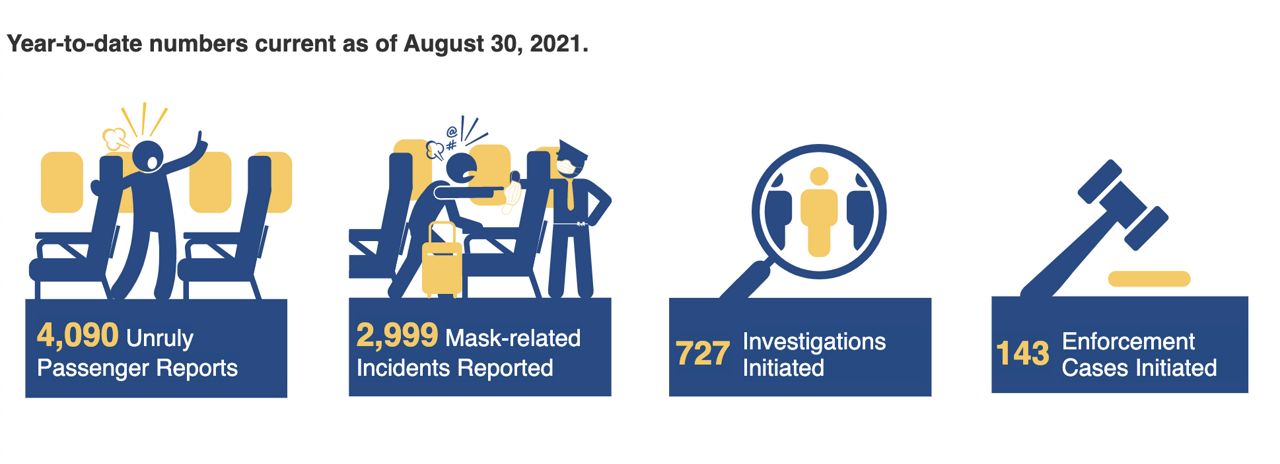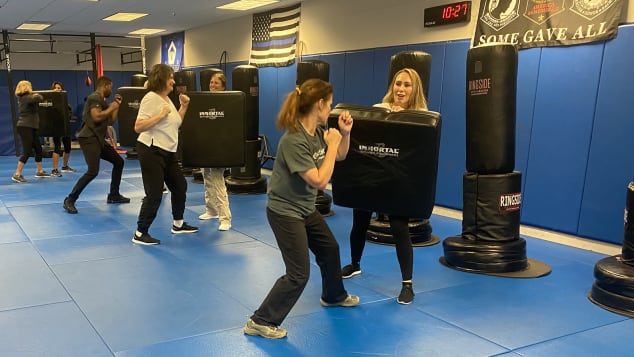Distracting The Pilots, Harassing/Assaulting Air Crew/Flight Attendants
"This is the most dangerous and uncertain time in our entire history.""Flight attendants are working longer days with shorter nights, wearing masks for 14, 15 hours a day ... having a harder time getting nutrition throughout the day and charged with keeping everyone safe on the plane.""Those are just the basics.""Taking self-defence training classes won't solve the issue of violence on planes, but] it gives just some basic manoeuvres to help better protect yourself from getting hurt."Sara Nelson, international president, Association of Flight Attendants-CWA"I just wanted to make sure that I'm prepared for anything that could happen.""I've been involved in situations before. And we have de-escalation scenarios that we try to run through to the best of our abilities, but sometimes it just gets to a level that we need a little extra defence training."Katie, training attendee, Federal Air Marshal Service New York field office"I think it's the many layers of stress.""There is the stress of getting to the airport, the stress of going through the security, stress of getting up early, stress of travelling, stress of family, travelling with family..."Judith, flight attendant, last name withheld
 |
| The New York Times |
Near LaGuardia Airport in New York an assemblage of flight attendants witnessed a drill in a fake airplane. An initiation to a four-hour self-defence training course operated by the Transportation Security Administration which offers such classes across the country, at no charge to flight crews, and has, since 2004. It is now -- during the time of the global pandemic and the slow recovery from the first lockdowns with air traffic resuming to reach its former levels -- that the training appears more relevant than ever before.
The flight attendants present watched a dramatic mock-up of a passenger assaulting a flight attendant who refused to give the drunk passenger the five drinks he demanded. When she demurred, the passenger made a violent lunge toward the attendant. Which was when an air marshal appeared on scene to subdue the passenger and cuff his hands behind his back. As a drill, it mimicked what air attendants are seeing in real time, on an increased basis.
 With air travel slowly rebounding from its arrest when no planes soared through empty skies during the first stage of the pandemic, close to 4,000 reports of unruly passengers were received by the Federal Aviation Administration in 2021. Representing a substantial increase from the 2019 total reports of 146 such incidents. The profession has seen effects of the pandemic wreaking havoc; from the fear of contracting coronavirus to the logistical issues of returning to an industry struck with a shortage of staff.
With air travel slowly rebounding from its arrest when no planes soared through empty skies during the first stage of the pandemic, close to 4,000 reports of unruly passengers were received by the Federal Aviation Administration in 2021. Representing a substantial increase from the 2019 total reports of 146 such incidents. The profession has seen effects of the pandemic wreaking havoc; from the fear of contracting coronavirus to the logistical issues of returning to an industry struck with a shortage of staff.New stressors drive flight attendants to arm themselves by seeking out the voluntary training available through these TSA self-defence training sessions. In its first years of operation, training sessions took place at a limited number of locations across the U.S., making it difficult-to-inconvenient for many attendants to match free time from travel schedules to attend the sessions. But the sites have expanded, making them accessible to more interested attendants.
Once the mock assault scenario was over, those in attendance were ushered to a room with a padded-mat floor, for demonstrations on how to physically and mentally prepare for aggressive-passenger interactions. From demonstration to active participation. Instructors demonstrated how to stand, move and approach an attacker. How to fight or defend themselves with hands, elbows, palms, knees, feet and shins.
Standard defence represents a punch to the face. But there are others, such as raking an attacker's face with fingernails. Mention of gouging an attacker's eyes brings winces of pain to the flight attendants' sensibilities. "Remember, this guy is attacking you", urged the air marshal. The newly-demonstrated techniques were practised by the flight attendants in session on the air marshals, on punching bags and on Body Opponent Bags; life-sized dummies.
A supervisory air marshal in charge, on-site for the training stated that a large part of the class is meant to encourage the build-up of self-confidence to convince the flight attendants they have the skills and determination to handle the issue of violence, to help defuse such potentially dangerous situations. A confident mindset, essential to carry out defence. "This is important training for flight attendants because it prepares them with the basic skills that are needed for them to be able to address unruly passengers on board aircraft", said supervisory air marshal Stephanie Metzger.
 |
| Flight attendants train at a gym in Florida. CNN |
Labels: Federal Air Marshal Service, Flight Attendants, Self-Defence Training, Transportation Security Administration, United States

0 Comments:
Post a Comment
<< Home